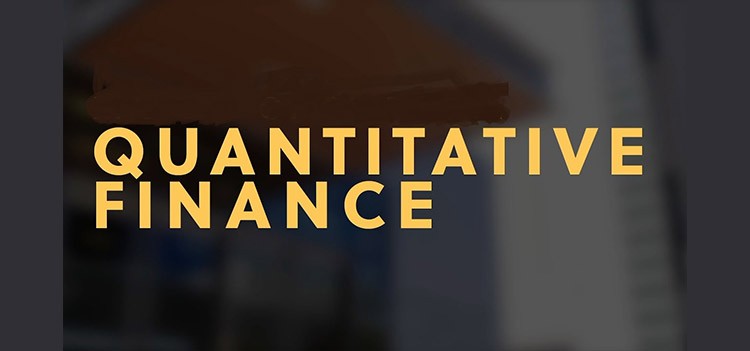Introduction to Quantitative Finance
Quantitative finance focuses on the mathematical models used to price securities and measure risk. Financial engineering goes one step further to focus on applications and build tools that will implement the results of the models. Financial engineering combines the mathematical theory of quantitative finance with computational simulations to make price, trade, hedge and other investment decisions.
Quantitative finance is the field of applied mathematics concerned with dealing with the financial markets. It is the design and implementation of mathematical models that are used for pricing assets including derivative products, assessing risk, trading and predicting market moves.
Few lines about MBA Quantitative Finance
The MBA Quantitative Finance course is a 2-years postgraduate course that is divided into 4-semesters. The course has the specialised subjects in finance that deals with the financial markets by applying mathematical modelling techniques. The course provides a platform for students to build quantitative skills and develop underlying financial theories.
The course trains the students on application of mathematical and statistical methods of financial and risk management problems. The course covers diverse financial topics like history of financial markets, computational finance, fintech, empirical asset pricing, financial management and econometrics, mergers & acquisitions, microeconomics, securities analysis and portfolio management, financial risk management and many more.
Eligibility
The students who have completed their degree in any stream with 50% aggregate from recognised university are eligible to apply for MBA Quantitative Finance course.
Admission Procedures
The students can take admission to MBA Quantitative Finance by two modes. The first one is merit-based admission and second one is direct admission.
Merit Based Admission
The students interested in merit-based admission for MBA Quantitative Finance course are required to appear for entrance exams conducted at national and international levels. The students also have to appear and qualify these entrance exams in order to get merit admission to MBA courses.
| Name of Exam | Conducting Authority | Month |
|---|---|---|
| CAT | Indian Institutes of Management | November |
| SNAP | Symbiosis Institute of Management | December |
| PGCET | Karnataka Examinations Authority (KEA) | July |
| ATMA | Association of Indian Management Schools | May |
| NMAT | Graduate Management Admission Council | October |
| MAT | All India Management Association | June |
| XAT | Xavier School of Management | December |
Direct Admission
The students have another option of getting admission to MBA Quantitative Finance course by direct admission process. Under this mode of admission, the students are given direct admission to their desired colleges and deemed or private universities under management quota. The direct admission students enjoy many special privileges like that they are not required to apply for any entrance exam for getting admissions. They have an option to choose their desired colleges and universities and book their seats in advance even before the starting of the academic year. The students who are interested in direct admissions are required to contact Galaxy Educational Services for more details.
Course Curriculum
The students of MBA Quantitative Finance will be studying the following subjects during their course duration
| Sl No | Subjects of Study |
|---|---|
|
1. |
Business Statistics |
|
2. |
Financial Management |
|
3. |
Microeconomics |
|
4. |
Business & Communication |
|
5. |
Essentials of Marketing |
|
6. |
Financial Accounting |
|
7. |
Financial Management |
|
8. |
Financial Mathematics |
|
9. |
Legal Aspects of Business |
|
10. |
Management of Operations |
|
11. |
Technology in Business |
|
12. |
Corporate Social Responsibility |
|
13. |
Research Methodology |
|
14. |
Integrated Disaster Management |
|
15. |
Financial Econometrics |
|
16. |
Financial Statement Analysis |
|
17. |
Security Analysis and Portfolio Management |
|
18. |
Macroeconomics |
|
19. |
Stochastic Process for Finance |
|
20. |
Corporate Governance and Ethics |
|
21. |
Cost Accounting |
|
22. |
Strategic Management |
|
23. |
Venture and Private Equity Funding |
|
24. |
Business Analytics |
|
25. |
Commercial Banking |
|
26. |
Corporate Valuation |
|
27. |
Derivative Markets |
|
28. |
Fixed Income Markets |
|
29. |
Financial Modelling |
|
30. |
Financial Risk Management |
|
31. |
Research Publication |
|
32. |
Behavioural Finance |
|
33. |
Concepts and Applications in Sustainability |
|
34. |
Conflict and Negotiations |
|
35. |
Creativity and innovation |
|
36. |
Introduction to the Microstructure of Markets |
|
37. |
Leadership and Capacity Building |
|
38. |
Mergers & Acquisitions |
|
39. |
Marketing of Financial Services |
|
40. |
Advanced International Finance |
|
41. |
Empirical Asset Pricing |
|
42. |
Fintech |
|
43. |
Finance Asset Management |
Career & Scope
The MBA Quantitative Finance students will be having ample job opportunities. They can find excellent opportunities in the banking sector, stock markets, financial agencies, etc.
Salary & Emoluments
The fresh MBA Quantitative Finance students will be earning around 5 lakhs to 7 lakhs per annum. The experienced professionals will be earning around 8 lakhs to 16 lakhs per annum.
Top Organisations hiring MBA Quantitative Finance students
Some of the organisations hiring MBA Quantitative Finance students are:
- HDFC Bank
- Axis Bank
- ICICI Bank
- Kotak Bank
- Muthoot Finance
Placement Opportunities
Some of the job roles available are:
Risk Manager: The risk managers advise organizations and businesses on any existing risks to their profits, identifying and evaluating possible threats and setting up contingency plans. Risk managers may specialize in technology risk, business continuity, markets and corporate governance (and a number of other areas).
Financial Manager: The financial managers provide financial analysis to companies, evaluating their products and assets and suggesting any changes where necessary. Typically, they are employed by banks, investment houses and mutual fund companies, they use their expertise in applied mathematics, statistics and IT to help businesses prosper.
Derivatives Trader: The derivatives traders are highly specialized stock traders. Simply put, they buy and sell derivatives (financial products that derive their value from their relationship with another asset or cash flow e.g. swaps, futures contracts, employee stock options, exchange traded stock options).
Asset Manager: As an asset manager one will be working in an asset management organisation. They are responsible to manage assets (intellectual property, human capital, financial assets and goodwill) on behalf of people and businesses in order to achieve the greatest possible returns.
Fund Manager: The fund managers handle and supervise funds to maximize returns. As a fund manager one could be working in a number of financial sectors, from banking or a brokerage firm, to insurance or the treasury departments of a large industrial group.
Financial Consultant: As a financial consultant, one will be offering the money management expertise and advice to individuals and businesses in order to guide them toward their desired long-term goals, which might be anything from debt management to growing their investments and savings.
Conclusion
The MBA Quantitative Finance students are in great demand in recent years. They can find ample job opportunities in the banking and financial sector. The organisations pay handsome salaries for skilled MBA quantitative finance students. The students with a passion towards finance predictions can join this course.




